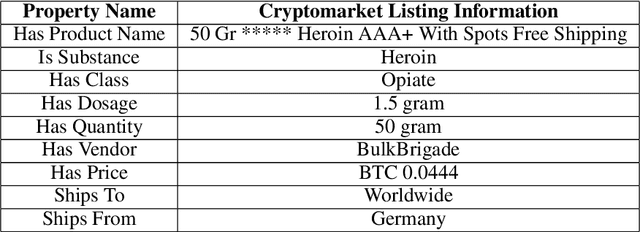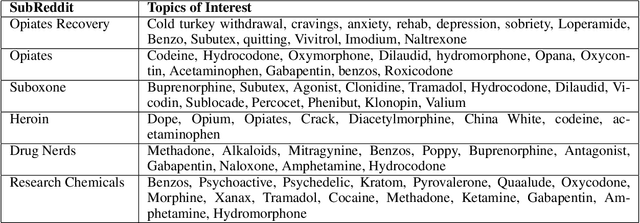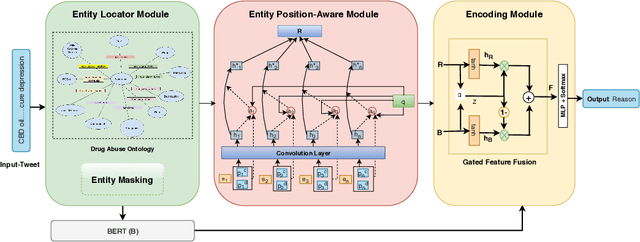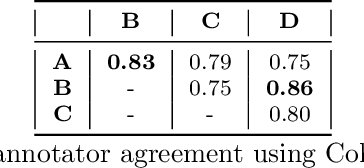Francois Lamy
"Can We Detect Substance Use Disorder?": Knowledge and Time Aware Classification on Social Media from Darkweb
Apr 20, 2023Abstract:Opioid and substance misuse is rampant in the United States today, with the phenomenon known as the "opioid crisis". The relationship between substance use and mental health has been extensively studied, with one possible relationship being: substance misuse causes poor mental health. However, the lack of evidence on the relationship has resulted in opioids being largely inaccessible through legal means. This study analyzes the substance use posts on social media with opioids being sold through crypto market listings. We use the Drug Abuse Ontology, state-of-the-art deep learning, and knowledge-aware BERT-based models to generate sentiment and emotion for the social media posts to understand users' perceptions on social media by investigating questions such as: which synthetic opioids people are optimistic, neutral, or negative about? or what kind of drugs induced fear and sorrow? or what kind of drugs people love or are thankful about? or which drugs people think negatively about? or which opioids cause little to no sentimental reaction. We discuss how we crawled crypto market data and its use in extracting posts for fentanyl, fentanyl analogs, and other novel synthetic opioids. We also perform topic analysis associated with the generated sentiments and emotions to understand which topics correlate with people's responses to various drugs. Additionally, we analyze time-aware neural models built on these features while considering historical sentiment and emotional activity of posts related to a drug. The most effective model performs well (statistically significant) with (macroF1=82.12, recall =83.58) to identify substance use disorder.
eDarkTrends: Harnessing Social Media Trends in Substance use disorders for Opioid Listings on Cryptomarket
Mar 29, 2021



Abstract:Opioid and substance misuse is rampant in the United States today, with the phenomenon known as the opioid crisis. The relationship between substance use and mental health has been extensively studied, with one possible relationship being substance misuse causes poor mental health. However, the lack of evidence on the relationship has resulted in opioids being largely inaccessible through legal means. This study analyzes the substance misuse posts on social media with the opioids being sold through crypto market listings. We use the Drug Abuse Ontology, state-of-the-art deep learning, and BERT-based models to generate sentiment and emotion for the social media posts to understand user perception on social media by investigating questions such as, which synthetic opioids people are optimistic, neutral, or negative about or what kind of drugs induced fear and sorrow or what kind of drugs people love or thankful about or which drug people think negatively about or which opioids cause little to no sentimental reaction. We also perform topic analysis associated with the generated sentiments and emotions to understand which topics correlate with people's responses to various drugs. Our findings can help shape policy to help isolate opioid use cases where timely intervention may be required to prevent adverse consequences, prevent overdose-related deaths, and worsen the epidemic.
"When they say weed causes depression, but it's your fav antidepressant": Knowledge-aware Attention Framework for Relationship Extraction
Sep 21, 2020



Abstract:With the increasing legalization of medical and recreational use of cannabis, more research is needed to understand the association between depression and consumer behavior related to cannabis consumption. Big social media data has potential to provide deeper insights about these associations to public health analysts. In this interdisciplinary study, we demonstrate the value of incorporating domain-specific knowledge in the learning process to identify the relationships between cannabis use and depression. We develop an end-to-end knowledge infused deep learning framework (Gated-K-BERT) that leverages the pre-trained BERT language representation model and domain-specific declarative knowledge source (Drug Abuse Ontology (DAO)) to jointly extract entities and their relationship using gated fusion sharing mechanism. Our model is further tailored to provide more focus to the entities mention in the sentence through entity-position aware attention layer, where ontology is used to locate the target entities position. Experimental results show that inclusion of the knowledge-aware attentive representation in association with BERT can extract the cannabis-depression relationship with better coverage in comparison to the state-of-the-art relation extractor.
 Add to Chrome
Add to Chrome Add to Firefox
Add to Firefox Add to Edge
Add to Edge